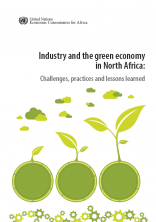Industry and the green economy in North Africa: challenges, practices and lessons learned
Industry and the green economy in North Africa: challenges, practices and lessons learned

For a number of countries, green economy is no longer a choice but a necessity dictated by the growing environmental degradation and depletion of their natural resources, and by climate change and its impact on food security, the energy transition, infrastructure and health. Unlike other African sub regions, North Africa has limited natural resources. Several countries are already under water stress and facing structural deficits in terms of food and energy security. In addition, this sub region is one of the world’s areas most vulnerable to climate change. Economic growth and social development policies have not brought the anticipated benefits, as unemployment and social and territorial disparities persist. While countries may have reduced absolute poverty, populations remain very vulnerable, in particular in rural areas, where about 70 per cent of the poor live. While the State may have a fundamental role in promoting green economy, by establishing a predictable global framework and conducting the reforms needed to stimulate investment and innovation, to rethink production and consumption models and to support capacity-building, the hoped-for transformation cannot be achieved without the involvement of the industry sector. The contribution made by industry to gross domestic product (GDP) is currently well below its potential. The sector would therefore benefit from optimizing the use of natural capital to generate productivity gains, disseminate new goods and services, create more jobs, stand up to global competition and meet the demands of international markets. The present report gathers the views of industrialists on the issue of the green economy and reviews their understanding of the associated challenges and opportunities and the progress made in integrating environmental and social challenges into their strategies and activities. It also highlights the constraints and expectations of enterprises where public policy reforms are concerned.







